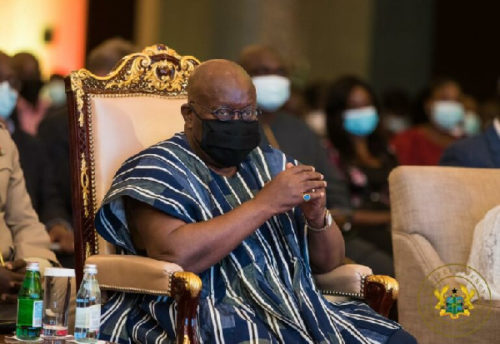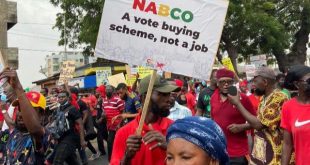
President Nana Addo Dankwa Akufo-Addo
The former Ranking Member for the Mines & Energy Committee of Parliament, Adam Mutawkilu says President Nana Addo Dankwah Akufo-Addo must be solely blamed for the $170 million judgment debt awarded to power company, GCGP.
According to the former Damongo MP, the decision to terminate the contract with GCGP was a cabinet decision and approved by President Akufo-Addo.
“It’s a clear financial loss to the state. We could have taken the plants and kept them, instead of just terminating the contract…We should hold Akufo-Addo responsible because he terminated the contract,” he said.
Mr Mutawakilu also dismissed suggestions by the Attorney General that investigations would be conducted into the contract which was signed under the erstwhile Mahama administration.
Speaking on the Morning Starr on Thursday, Mr Mutawakilu said the investigations will amount to nothing adding that the move is a deliberate action by the government to shift the blame.
“What investigation are they going to do? I believe that they just want to find time, do blame games and then we forge. Nothing will come out of the investigations. They just want to shift blames and then we forget. They should sit with the company, settle it and see if we can complete the power agreement and make good use of it.”
Background to $170m judgment debt
A London court in a ruling on Wednesday, June 8, refused to grant the government of Ghana an extension to apply to set aside the award – adding that the state’s grounds for challenging it were “intrinsically weak”.
The government through its lawyer Godfred Dame had attempted to hide behind the 2020 general election and the COVID-19 pandemic as excuses for the delay, but their excuses were dismissed by the London court.
GPGC was represented before the court by Charles Kimmins QC and Mark Tushingham, where Ghana was said to have been too late to challenge the decision against it.
Ghana had used Khawar Qureshi QC of Serle Court and Volterra Fietta, having initially retained Omnia Strategy. In the arbitration, GPGC, used Three Crowns and Ghanaian firm, Kimathi & Partners, along with damages experts from FTI Consulting.
Ghana also had representation from the attorney general’s office and Amofa & Partners in Accra.
The three-member arbitration tribunal chaired by John Beechey, a former President of the International Criminal Court’s Court of Arbitration, and co-chaired by Prof Albert Fiadjoe, a Ghanaian academic, sided with the power producer and awarded almost US$170 million, including interest.
Out of the total, U$134.35 million represents the early termination payment claim, which itself is made up of US $69.36 million as an early termination fee, US$58.49 million for mobilisation costs, US$6.46 million as demobilisation cost and US$32,448 as preservation and maintenance cost.
The tribunal also awarded US$614,353.86 against the country as the cost of the tribunal, and costs of US$3 million against Ghana, being the legal fees expended by the GPGC during the arbitration.
Major highlights of the tribunal’s decision included the fact that the Ahenkora Committee which recommended the termination of the contract did not have sufficient ground in coming to the conclusion that the GPGC was entitled to only $US18 million in early termination fees.
The tribunal, in dismissing Ghana’s case, delved into the basis for terminating the contract, stating that the evidence before it indicated that “GPGC did have a building permit for the Blue Ocean Site issued by the Kpone-Katamanso District Assembly on August 15, 2017.”
“GoG [The government] has not been able to adduce any statute or regulation, including the Energy Commission Act, which addresses the requirement for any such additional construction permit,” the Tribunal ruled.
“On the basis of the record as it now stands, it is apparent that even as Dr. Ahenkorah [Energy Commission Executive Secretary at the time] was putting up further hurdles over which he required GPGC to jump in pursuit of its provisional generation license in November 2017, the Minister of Energy was about to seek the approval of the Ghanaian Parliament of a decision to terminate the EPA along with a number of other PPAs, based upon the Report of the PPA Committee chaired by Dr. Ahenkorah,” it said.
Under British law, the government had 28 days to challenge the tribunal’s decision. However, it went to sleep only to appear in court three days to the expiry of the deadline to ask for an extension.
Omnia Strategy, a British law firm, made the case for extension and asked for 56 days—twice the allowed grace period.
However, the court set March 8, 2021, for the Government to file the processes to challenge the Tribunal’s decision in January. But again, the government took a long nap until April 1, 2021, before filing. This time, another British law firm, Volterra Fietta, had instructions from the government to begin the process.
The law firm, which tagged itself as the only dedicated public international law firm in the world, explained that the new Attorney General, Godfred Yeboah Dame, had only been sworn in on March 5, and the firm received the directive to represent Ghana 10 days later.
But ruling on the matter on June 8, 2021, the court had no sympathies. It said the excuses were unreasonable and “intrinsically weak.”
The presiding judge, Justice Butcher did not hold back.
The judge said the government’s delay was “significant and substantial” as its request for a second extension had come 38 days after the statutory deadline and 27 days after the first extension expired, the Global Arbitration Review (GAR) reported.
He noted that the large sum of money involved in the arbitration was not enough grounds for the appeal to take as long as it did.
“The fact that the Attorney General had not been sworn until March 5 did not mean the government was unable to act in the meantime, the judge said.
Background to the arbitration
The International Court of Arbitration in January 2021 awarded a cost of $134 million and an interest of $30 million against the Government of Ghana over the cancellation of an Emergency Power Agreement with GCGP limited.
The Contract was cancelled under the former Energy Minister Boakye Agyarko as part of several other energy contracts cancelled by the NPP on the basis that the country did not need those power agreements.
The ruling by the International Court of Arbitration ordered the government to Ghana to pay to “GPGC the full value of the Early Termination Payment, together with Mobilization, Demobilization and preservation and maintenance costs in the amount of US$ 134,348,661, together also with interest thereon from 12 November 2018 until the date of payment, accruing daily and compounded monthly, at the rate of LIBOR for six-month US dollar deposits plus six per cent(6%).”
The Government of Ghana was also to pay GPGC an amount of “US$ 309,877.74 in respect of the Costs of the Arbitration, together with US$ 3,000,000 in respect of GPGC’s legal representation and the fees and expenses of its expert witness, together with interest on the aggregate amount of US$ 3,309,877.74 at the rate of LIBOR for three-month US dollar deposits, compounded quarterly.”
Source : Ghanaweb
 African News Best News Portal
African News Best News Portal



